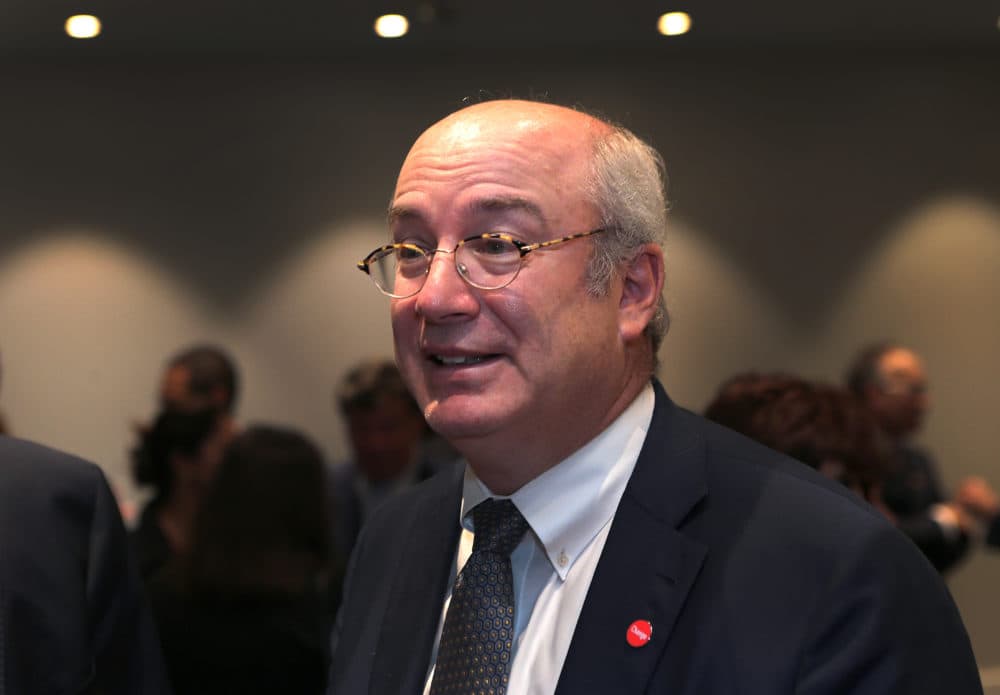Advertisement
Mass. General President Peter Slavin On His Decision To Step Down After 18 Years

Dr. Peter Slavin has spent much of the past four decades at Massachusetts General Hospital — first during his time as a medical student at Harvard, and most recently, for 18 years as the hospital's president.
But Wednesday, Slavin announced he is stepping down from his post. He'll stay on at MGH until a replacement is found.
In addition to running a world-class academic medical center, the physician-turned-administrator is known for starting initiatives related to the health impacts of climate change, the public health crisis surrounding gun deaths, and social justice and equity issues.
Slavin says one of the efforts he's most proud of is Mass General's push to recruit a diverse group of trainees who are under-represented in medicine. This year, according to Slavin, they make up 26% percent of incoming residents.
"So we're bringing in to Boston 67 physicians from around the country — incredibly talented — half of whom are Black, the other half Hispanic," Slavin said. "And so I think they're going to contribute enormously to our institutions and to the overall equity within our community."
Slavin is the latest in a series of executives and high-level doctors to announce their departure from the Mass General Brigham system in the last several months. The organization had long been known as Partners HealthCare, but re-branded itself as Mass General Brigham, or MGB for short, with a plan to streamline operations.
Slavin says he's leaving because he's ready for a change in his career and because several big efforts, including that new integration and the construction of a new building on Cambridge street, are getting underway.
He joined WBUR's All Things Considered host Lisa Mullins to discuss his choice to step away now.
Below are highlights from their conversation, which have been lightly edited.
Interview Highlights
On whether the pandemic and all of its stresses were a factor in his decision:
"Every year I've been in this job, it's been a grueling year. This type of position is 24/7, 365. So in some ways, the pandemic hasn't changed that. There's no doubt that it's had an impact on the staff ... But as I round throughout the hospital, the number of COVID patients that we're caring for in the hospital is relatively small, although I'm worried that the numbers are increasing, not decreasing. But I think the culture of the place and people's love of caring for patients, love of working with one another, is at, or pretty close to, baseline. And I'm very pleased to see that."
On the move to make Mass General Brigham more integrated, with many big decisions coming out of the central office:
"I think it makes sense for us to act and behave more like an organized and integrated system than a series of independent hospitals, which is how we behaved for most of the history of Partners, now, MGB. That kind of new [integrated] behavior has been incredibly helpful during the pandemic; particularly during the first peak, we were pretty overwhelmed with COVID patients, having nearly 400 in the hospital at one point in time. But we've been able to what we call 'level-load' patients and move patients around the system to try to use the full capacity of the system and make sure that all patients can get the care they need."
On the high price of medical care at MGH:
"We care for everyone, regardless of their ability to pay. And for people who have significant balances, we work with them to try to deal with those in as gentle a fashion as possible. Mass General was created over 200 years ago to care for the disadvantaged people in our society. And we do a lot of that now and are determined to do that long into the future.
"One of the big initiatives going on within our health system is to try to move care that can be delivered in the community to the community. We want to establish these ambulatory sites that will not even charge hospital rates, but lower rates than that. We're trying to move care of patients from the academic medical centers — MGH and the Brigham — to some of our community hospitals. And so we're trying increasingly to focus the care at Mass General and the Brigham on patients who can't really get that kind of care anywhere else."
On whether there's a patient or mentor who stays with him and has helped shape his priorities and outlook:
"I guess the person who comes to mind is my great-grandfather. He immigrated from Lithuania around 1905 — was a Jewish immigrant fleeing persecution in Lithuania — and settled in the city of Malden. Shortly after he got here, he was involved in an accident and developed an infection in the bone of his leg. And he received, over a 10-year period of time, outpatient care at Mass General — where dressings were applied to that leg to prevent the need for amputation. And my great-grandfather also barely made a living selling chickens. And so all the care that he received at the hospital was free.
"So I have his picture on the wall in the conference room I use every day as a reminder that Mass General can have a huge impact on families regardless of their ability to pay, and that the kind of technologically advanced and compassionate care that my grandmother told me about that her father received is a constant reminder to me about what this hospital stands for and needs to continue to aspire to be."
This segment aired on April 7, 2021.

